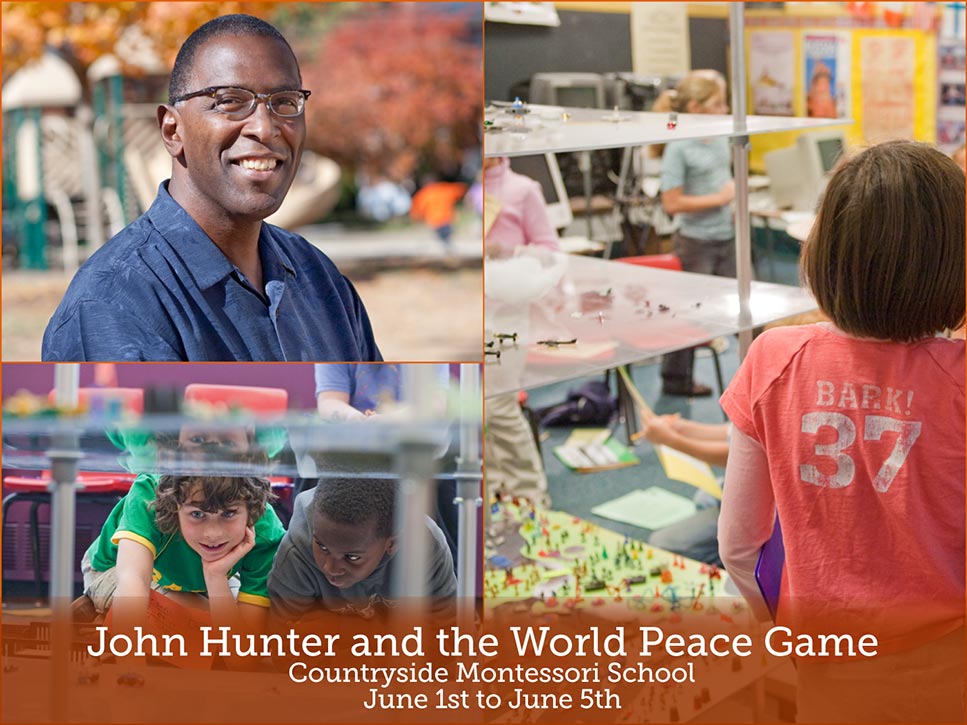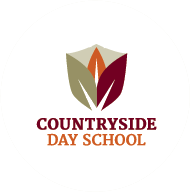A Coveted TED speaker comes to Countryside to teach a Master Class!
One of the 100 most popular TED speakers, John Hunter, will be coming to Countryside to teach a Master Class of the World Peace Game in June. Not only will he be working with our teachers, he will also be guiding our own elementary students in five days of the game from June 1 – 5. John Hunter is an internationally known educator and speaker who has touched the lives of thousands of teachers and students alike.
“John Hunter, a teacher from Virgina, developed the World Peace Game over thirty years ago, teaching it all over the world to students as young as nine-years-old” (source). The game challenges “children to come up with solutions to global problems such as chemical spills, environmental disasters and famine, peacefully. The World Peace Game, a hands-on political simulation for nine and 10-year-olds, has now been played around the world” (source). “A documentary covering the game process was made and in 2011, he gave a TED talk on his experiences, which Arianna Huffington named the top talk that year” (source).
Hear from John Hunter himself…
From the Guardian:
In 2006, I was ready to put the game away because there was no interest beyond my classroom. I thought it was a good piece of curriculum and wished I could share it. But it was physically so large, with many moving parts, and I didn’t think there was much chance of that happening.
Along comes a documentary filmmaker called Chris Farina and he suggested we make a movie. They brought in a small film crew for about eight to 10 weeks and filmed one of the World Peace Game cycles in my fourth grade classroom. Four years later in 2010, it was shown at the Bergen international film festival in Norway…
It’s astonishing how a little film about education led to my game being played by world leaders. We were invited to speak at a TED conference in California and I began touring the world, sharing my game with other teachers. I was invited to attend a screening of the film at the UN and then we were invited to the Pentagon, where the film had been screened four times already. They brought my students in for another visit and four or five generals spent an entire day having serious strategy and tactics discussions with my nine-year-olds. Although it was a game, it was taken quite seriously and with due respect…
The students are human agents in the game. I allow them to be completely human and reactive – there is nothing to constrain them. That means they can choose to behave badly in the game. The rules state that I can do nothing to interfere. I can only ask questions and point out whether they have considered the consequences of their actions. It’s a huge risk every time, but my faith and confidence in the children makes me think they can. There is something in children, and all humans at some level, that means they simply want to do what feels good, helpful, useful and kind…
The game is designed for nine year olds and at first I didn’t know whether they could do it or not. But I had great confidence in them and thought we’d give it a go. And sure enough, they were able to do it in a unique, unpredictable, astounding, innovative way every time. It gives me great confidence in what is possible and quite a few of those students have gone on to work in diplomacy and leadership positions. It’s had a real, long-term impact on their lives.
I see the game as an apple seed, which will one day grow into an orchard producing thousands of bushels of fruit. The possibility of one seed is so great. So what I am trying to do now is simply give the seed out for other teachers to plant. But it is not for every student, every teacher, every class. Teachers have got to deal with and be comfortable with the unknown, giving control and power to the students in the classroom so that the children become co-teachers. They are the sole source of authority and information in this game. Teachers need to deal with their own fears, expectations and hopes around that concept.
John Hunter’s TED Talk about the World Peace Game
From the Huffington Post
After the Ted talk, I was approached by a well-dressed woman who handed me a card and said ‘Mr Hunter, we’d like to see you’. I looked at the card and it said ‘Defence Department, Pentagon’.
So the filmmaker Chris Farina and I went & when we got there that the film had already been screened 4 times, and a fifth when we arrived. Afterwards, we had the most profound discussion for two hours in the under-secretaries office with policy and military people, who’d been in war and battle. They were having the same feelings the kids did; the doubt, the fear, the confusion. About a week later, we got a phone call; they had asked us to return, this time with the kids. And so the kids studied for a couple months, real facts about real countries, to become experts and develop questions to ask the Pentagon themselves. They got a full-day tour with 2, 3, 4-star generals, from every branch of the service, having genuine talks with them, not for photo-ops. They would present real-life scenarios and how they dealt with it and asked the kids opinions.
Defence Secretary Leon Panetta initially even had ten minutes to spend with them and he ended up with his coat off spending a half-hour in an actual back-and-forth talk, as someone looking for answers in unexpected ways. The kids got a special coin, a military honour, Panetta’s own office stamp. We were invited back this year to bring the new class, and told to bring the Game because their Generals want to play and want to find out how the kids actually do this.







Leave a Comment